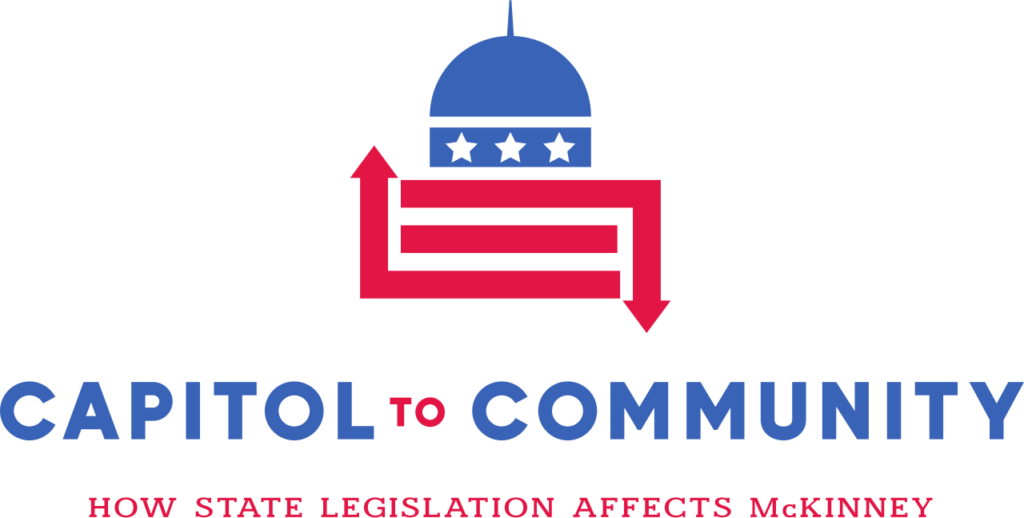CAPIToL TO COMMUNITY: HOW STATE LEGISLATION EFFECTS LOCAL LAW
Learn about What happens in Austin and how it affects you
Our mission is to explore how state legislation shapes life in McKinney and address the challenges it creates for our growing city. This year, we’re focusing on three critical issues: preserving local control amid state overreach through laws like the “Death Star Bill,” addressing urgent infrastructure needs in water and transportation, and managing growth and annexation to ensure sustainable development. By engaging with these topics, we aim to inform, empower, and inspire our community to advocate for meaningful change and a stronger future for McKinney.

Mission & Vision
Connecting State Decisions to Local Impact.
Mission
To assess the impact of state legislation on McKinney, identify challenges and opportunities, and empower our community with knowledge and strategies to protect local interests and enhance quality of life.
Vision
A well-informed and engaged community that collaborates to preserve McKinney’s autonomy, drive sustainable growth, and advocate for policies that secure a thriving future for all residents.
Explore the issues that matter
there are many relevant issues in mckinney that matter: these three are the main ones we'll explore together.
Examines challenges to local control due to state legislation limiting the authority of home rule cities like McKinney.
Addresses critical infrastructure priorities, including water sustainability and transportation development, to support the city’s growth.
Focuses on urban planning and managing McKinney’s expansion while navigating state-imposed restrictions.

Deep Dive: Explore Topics and activate change
Explore the topics and videos, understand both sides of the issues.
Before you begin... Understand Home Rule City Autonomy: Death Star Bill
This issue centers on preserving McKinney’s ability to govern itself as a home rule city amidst increasing state interference. The “Death Star Bill” (HB 2127) represents a significant challenge, as it overrides local ordinances and long-standing legal frameworks that grant cities autonomy. By enabling individuals to sue cities over ordinances they disagree with, this legislation threatens McKinney’s ability to tailor policies to its unique needs. The focus here is on understanding the bill’s implications, raising awareness, and exploring strategies to protect local decision-making.
All caught up? Let's go...
Infrastructure Needs: Water and Transportation
Rapid population growth in McKinney has created pressing demands for robust infrastructure, particularly in water management and transportation. The city faces challenges in maintaining an adequate water supply, as resources like the Bodark Reservoir are insufficient for long-term growth. Similarly, transportation infrastructure requires significant state funding and planning, with projects like the 380 bypass and other road expansions being crucial for mobility and safety. This issue examines how state policies and funding allocations impact McKinney’s ability to address these critical needs and sustain its growth trajectory.
Annexation and Growth Management
As McKinney continues to expand, managing growth and annexation becomes a vital concern. State legislation restricting annexation impacts the city’s ability to plan and develop new areas effectively. These laws often result in “extraterritorial jurisdiction” (ETJ), where residents benefit from city services without contributing equitably through taxes. This challenge requires balancing urban planning, local governance, and state-imposed limitations to ensure sustainable growth. The project explores how McKinney can navigate these constraints while maintaining a thriving, well-planned community.
Download the Quick Start Activation Guide
Download the guide to understand these core issues and how they effect McKinney directly.

Register To Vote and Make Your Voice Heard
News from around the web
Latest News
-
Rollins, ag committee leaders discuss ag labor, H-2A
Source: Texas Farm Bureau Published on 2026-01-13
-
FCC bans foreign-made drones, raising concerns for agriculture
Source: Texas Farm Bureau Published on 2026-01-13
-
Panhandle farmers are runner-up in national Achievement Award contest
Source: Texas Farm Bureau Published on 2026-01-12
-
TFB’s early ag teacher event recognized for AFBF New Horizon Award
Source: Texas Farm Bureau Published on 2026-01-12
-
TFB earns national recognition for 2025 member programs
Source: Texas Farm Bureau Published on 2026-01-12
-
Ag groups call for year-round sales of lower-cost E15 fuel
Source: Texas Farm Bureau Published on 2026-01-12
-
Farm bill, ag labor among ag committee top priorities
Source: Texas Farm Bureau Published on 2026-01-12
-
Texas launches website for complaints against state colleges, universities
Source: KERA texas Published on 2026-01-12
-
USDA seeking comments on foreign farmland reporting standards
Source: Texas Farm Bureau Published on 2026-01-09
-
Cross-laminated timber offers new opportunities for Texas forestry
Source: Texas Farm Bureau Published on 2026-01-09
-
Proposed WOTUS rule brings certainty to farmers, ranchers
Source: Texas Farm Bureau Published on 2026-01-08
-
Disaster, dairy, on-farm storage program signups underway
Source: Texas Farm Bureau Published on 2026-01-08
-
Benavidez to serve as USDA chief economist
Source: Texas Farm Bureau Published on 2026-01-07
-
TFB scholarship open for rural veterinary students
Source: Texas Farm Bureau Published on 2026-01-07
-
Texans to compete at 2026 American Farm Bureau Convention
Source: Texas Farm Bureau Published on 2026-01-06
